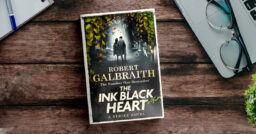Why is Strike attracted to drama?
Strike, who had met countless rootless and neglected children during his rackety, unstable childhood, recognised in Billy’s imploring expression a last plea to the adult world, to do what grown-ups were meant to do, and impose order on chaos, substitute sanity for brutality. Face to face, he felt a strange kinship with the emaciated, shaven-headed psychiatric patient, because he recognised the same craving for order in himself.
Lethal White by Robert Galbraith
From a quick glance at Cormoran Strike’s CV, it looks like he has sought out drama throughout his adult life. At university he plunged into a longterm relationship with a beautiful, volatile woman, fuelled and defined by her need for confrontation; he then chose a career with the army in the Specialist Investigations Branch which intimately involved him in investigations of violent death and the human misery which surrounds it, then, after the injury which cost him half of his leg, he set up as a private detective, again ensuring he would be working for people in crisis, but without the supporting structure of the army and the security of regular pay. At the same time though Cormoran dislikes public scenes, shuns publicity and is an intensely private man, resenting and deflecting questioning from even close family and friends. He seeks the sanctuary of his spartan flat above Denmark Street in times of stress or distress, and buries himself in work when troubled by personal problems. So if he does not enjoy drama, why does he constantly put himself in its path?
‘He is left with a respect for women like his mother who resist convention, and is grateful that Leda loved him well enough and long enough, to stop him breaking in moments of crisis.’
Cormoran Strike is the illegitimate son of rock star Jonny Rokeby and supergroupie Leda Strike. Rokeby wanted nothing to do with Cormoran when he was a child and so he and his half-sister Lucy were raised by his chaotic and free-spirited mother with occasional periods of stability at the home of his Aunt Joan and Uncle Ted in St Mawes, Cornwall. Confusing bouts of affluence ended in quick descents back into chaos and squalor, they rarely stayed in the same place for more than six months. This upbringing has affected the two half-siblings very differently. Lucy’s unpredictable and sometimes terrifying childhood, has left her with a need for order. At fourteen she left Leda to live permanently with Joan and Ted, and as an adult has forged a life which seems to Strike the acme of all that is conventional and unimaginative. It seems Lucy wants to erase the life they lead with Leda of squats and communes, outsiders and misfits, replacing it with her respectable middle-class husband and home in the suburbs. ‘Leda wasn’t my mother,’ she tells Strike. ‘I always hated it when Leda came to take us away … but you were glad to go.’
That’s not how Cormoran remembers it, but he cannot hate his mother or disown her as Lucy seems to. He suffered during his childhood, moving from school to school, forced to abandon friends in Cornwall whenever Leda appeared to carry away her children, and having to study for his A levels in the squat Leda was sharing with Jeff Whittaker, the sadistic failing musician who finally drove Lucy away with his bullying. When Lucy left though, Cormoran chose to stay, determined to wait Whittaker out, and his memories of Leda are tinged with affection as well as frustration. He is left with a respect for women like his mother who resist convention, and is grateful that Leda loved him well enough and long enough, to stop him breaking in moments of crisis. The constant uprooting and urge for something new fitted him for a career in the military, and the exposure to a huge range of people and places have taught him how to adapt, changing his accent or blending into a crowd despite his size. It also taught him about violence and human cruelty, equipping him to face it in his career as an investigator inside the army and out of it.
‘Joan and Ted and the community of St Mawes remain an example of love and stability in a life marked by desertions, even if that love and stability is something he can find suffocating at times.’
Though he carries much of Leda with him, like Lucy, Cormoran has also been deeply influenced by his aunt and uncle in Cornwall. He has learnt his tidy habits not just from the military, but also from his uncle – Ted’s liking for order everywhere from his toolbox to his boathouse is reflected in Strike’s habits. Cormoran keeps his own home organised, never neglecting simple routines of cleanliness like his washing up even at his lowest moments. His files are well organised enough to impress Robin when she arrives and his questioning of witnesses is careful, well-planned and methodical. Cormoran also saw in Ted’s career as a Red Cap a model for his own. While Charlotte, Lucy and Joan, all fought against Cormoran leaving university early to join the army, Ted quietly supported him. Joan and Ted and the community of St Mawes remain an example of love and stability in a life marked by desertions, even if that love and stability is something he can find suffocating at times.
‘No other lover has had the same impact on Cormoran as Charlotte.’
His sixteen year on and off relationship with the beautiful and self-immolating Charlotte Campbell was full of drama, but there were moments of supreme happiness with her too, some of the best moments of his life. Her upbringing was as chaotic as his own, and they understood each other in a way very few people among their friends and family ever did. For Charlotte, Strike was safety and freedom combined, the man to which she always returned. Only when her lies crossed a final line did Strike leave her, and even then, Strike was on the point of chasing after her. Only colliding with his new temporary assistant, Robin, on the stairs at Denmark Street stopped him.
No other lover has had the same impact on Cormoran as Charlotte. Dave Polworth, Strike’s oldest friend, has a clear idea of the sort of women who are attracted to Strike: ‘neurotic, chaotic and occasionally dangerous, and their fondness for the bent-nosed ex-boxer indicated a subconscious desire for something rocklike to which they could attach themselves like limpets.’ Nina, Elin and Lorelei are accomplished and clever women, but Strike never lets them get a grip on him. He remains detached, always putting work first and sometimes choosing the solitary sanctuary of his flat rather than see them. He is reluctant to share with them anything other than a limited amount of his time and his bed, and when these relationships end he feels relief rather than regret. He can read accusing texts from Lorelei without a change of expression and resists her attempts to meet in person at the end of their relationship. He does not want to witness Elin’s distress, but finds himself thinking of his best route home as she weeps. He wonders if his relationship with Charlotte has blunted his feelings, but whatever the cause, the women find him as impossible to move as the rock Dave compares him to. He absents himself from their dramas, even when he is the root of them. When he makes the final break with Charlotte, he lives in his office to avoid face to face sympathy and post-mortems.
‘When Cormoran meets Billy, in Lethal White, a disturbed young man who is troubled by visions of violence from his childhood, Cormoran feels a sense of kinship.’
So Strike seems to have a contradiction at his core. He’ll avoid confrontation for as long as possible in his personal life, but will constantly risk it in his professional life, confronting men and women with their lies, and their crimes, willing to face any scene to untangle complex truths hidden by shame, guilt or self-interest. His career rests on his ability to ask questions, to probe, to notice evasions and gaps in other people’s stories, but he loathes being questioned himself. He seeks solitude and order, but involves himself professionally with the tangled mess of humans in extreme crisis. He does not miss the highly charged scenes with Charlotte, but finds the conventional relationships offered by other women unattractive.
Perhaps the apparent contradictions are best resolved by moments when Strike sees himself reflected in other people. When Cormoran meets Billy, in Lethal White, a disturbed young man who is troubled by visions of violence from his childhood, Cormoran feels a sense of kinship. Billy is asking for order instead of chaos, sanity rather than brutality, and Cormoran recognises that craving for order in himself. Charlotte sees his drive to find answers to complex problems, as a key part of their relationship. ‘You didn’t want to save me, Bluey. You wanted to solve me. Big difference.’
‘Drama is an integral part of his work, and work is how he deals with the drama of his own life and finds refuge from it.’
Lucy believes that their mother’s death and the mystery surrounding it has driven his investigative career, but Cormoran thinks Lucy is in truth more troubled by the trauma of their childhoods than he is. She denies and tries to bury the confusion and complexity. He seeks to understand it. Thinking of Robin, he recognises how she has dealt with the violence which touched her life not by ignoring it, but by courageously investigating and resolving other crimes, other dramas. He recognises that need in himself. It is not a need for drama but for understanding, however ugly and dark the truth he uncovers might be.
Drama is an integral part of his work, and work is how he deals with the drama of his own life and finds refuge from it. As he admits himself only one subject had ever matched Charlotte for the fascination it exercised over him: unnatural death. It is a fascination he shares with Robin, the woman who respects his privacy more than any other, and because she respects his privacy, his silences, he tells her more than he tells anyone else. He also listens to her when she is angry with him, and takes trouble with their relationship while his lovers’ requests, calls and texts go unanswered.
The dramas of Cormoran’s life, and his innate fascination with unanswered questions has put him on a path which might confuse and distress his friends, families and lovers, but the mild comforts of Lucy’s suburban life will never satisfy him, or Robin.




